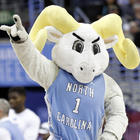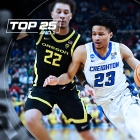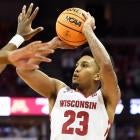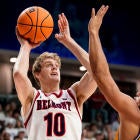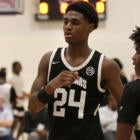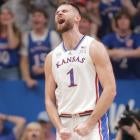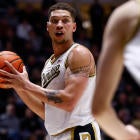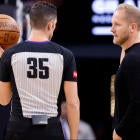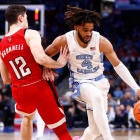The NCAA's Committee on Infractions will hear North Carolina argue the merits for its response to multiple major violations stemming from a long-running investigation of the athletic department, particularly its ties to "anomalous classes" in the African-American Studies.
The chief hearing officer for the meeting, set for Oct. 28, will be SEC commissioner Greg Sankey and the panel is made up mostly of university administrators but also includes former Northern Illinois football coach Joe Novak. Following the hearing -- which starts at 8 a.m., for those really wanting to track this thing -- a ruling should better clarify the timeline of events.
Since the NCAA will be making rulings in the middle of college basketball season, it's guaranteed that North Carolina, thanks to hoops, will already be in the headlines. The fact that North Carolina is challenging the NCAA's authority in the case also makes it precedent-setting for the industry of college athletics. In a busy year for the association that has included moving championship events, this case could end up being the biggest story of 2016.
"Our response to the ANOA addresses the scope of the NCAA's regulatory authority as stated in its bylaws. This case involves core institutional issues--academic issues--not covered by the NCAA's bylaws. It also looks at issues regarding fairness and consistency and the NCAA's statute of limitations," the school said in August.
The NCAA's case against North Carolina has been multi-pronged and extended for more than six years, covering both an agent scandal in the football program (for which the team was punished with probation, scholarship reductions and a one-year postseason ban) and an academic scandal involving the entire athletic department and a series of "anomalous" classes that went unchecked in the African-American Studies department.
The allegations, according to the NCAA, summarized:
Allegation No. 1
Jan Boxill, women's basketball athletic academic counselor in the Academic Support Program for Student-Athletes (ASPSA) knowingly provided extra benefits in the form of impermissible academic assistance and special arrangements to women's basketball student-athletes.
UNC's response: North Carolina agrees "that in 15 of the 18 alleged instances, Boxill provided extra benefits in violation of Bylaw 16.11.2.1 in her capacity as an ASPSA academic counselor." However, UNC is arguing that her actions do not fall under the NCAA's definition of unethical conduct, "even though her actions fell short of the University's own standards."
Allegation No. 2
Deborah Crowder, former student services manager in the African and Afro-American Studies department, violated the NCAA principles of ethical conduct during the NCAA's investigation.
Response UNC agrees with the charges relating to Crowder's failure to cooperate "despite repeated requests by the enforcement staff and the University."
Allegation No. 3
Dr. Julius Nyang'oro, former chair of the African and Afro-American Studies department, violated NCAA principles of ethical conduct during the NCAA's investigation into UNC.
Response: UNC agrees with the charges relating to Nyang'oro's failure to cooperate "despite repeated requests by the enforcement staff and the University."
Allegation No. 4
From the 2005 fall semester through the 2011 summer semester, the University of North Carolina violated the NCAA Principle of Rules Compliance in its failure to monitor the ASPSA and the African and Afro-American Studies department.
Response: North Carolina is fighting the failure to monitor charge, believing the issues fall under the jurisdiction of the school's accrediting agency, SACSCOC, not the NCAA.
Allegation No. 5
The NCAA has charged UNC with a violating the NCAA Principle of Institutional Control and Responsibility.
Response: North Carolina does not agree with the lack of institutional control charge. Bubba Cunningham said Tuesday on a conference call that while academic irregularities didn't meet the standards of the university they didn't necessarily violate an NCAA bylaw.













